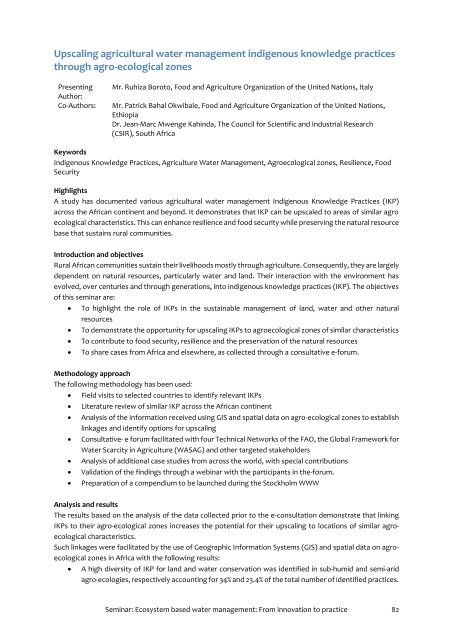2018 Abstract Volume
A compilation of the oral and written scientific presentations chosen to be part of World Water Week 2018 Seminars.
A compilation of the oral and written scientific presentations chosen to be part of World Water Week 2018 Seminars.
You also want an ePaper? Increase the reach of your titles
YUMPU automatically turns print PDFs into web optimized ePapers that Google loves.
Upscaling agricultural water management indigenous knowledge practices<br />
through agro-ecological zones<br />
Presenting<br />
Author:<br />
Co-Authors:<br />
Mr. Ruhiza Boroto, Food and Agriculture Organization of the United Nations, Italy<br />
Mr. Patrick Bahal Okwibale, Food and Agriculture Organization of the United Nations,<br />
Ethiopia<br />
Dr. Jean-Marc Mwenge Kahinda, The Council for Scientific and Industrial Research<br />
(CSIR), South Africa<br />
Keywords<br />
Indigenous Knowledge Practices, Agriculture Water Management, Agr0ec0logical zones, Resilience, Food<br />
Security<br />
Highlights<br />
A study has documented various agricultural water management Indigenous Knowledge Practices (IKP)<br />
across the African continent and beyond. It demonstrates that IKP can be upscaled to areas of similar agro<br />
ecological characteristics. This can enhance resilience and food security while preserving the natural resource<br />
base that sustains rural communities.<br />
Introduction and objectives<br />
Rural African communities sustain their livelihoods mostly through agriculture. Consequently, they are largely<br />
dependent on natural resources, particularly water and land. Their interaction with the environment has<br />
evolved, over centuries and through generations, into indigenous knowledge practices (IKP). The objectives<br />
of this seminar are:<br />
• To highlight the role of IKPs in the sustainable management of land, water and other natural<br />
resources<br />
• To demonstrate the opportunity for upscaling IKPs to agroecological zones of similar characteristics<br />
• To contribute to food security, resilience and the preservation of the natural resources<br />
• To share cases from Africa and elsewhere, as collected through a consultative e-forum.<br />
Methodology approach<br />
The following methodology has been used:<br />
• Field visits to selected countries to identify relevant IKPs<br />
• Literature review of similar IKP across the African continent<br />
• Analysis of the information received using GIS and spatial data on agro-ecological zones to establish<br />
linkages and identify options for upscaling<br />
• Consultative- e forum facilitated with four Technical Networks of the FAO, the Global Framework for<br />
Water Scarcity in Agriculture (WASAG) and other targeted stakeholders<br />
• Analysis of additional case studies from across the world, with special contributions<br />
• Validation of the findings through a webinar with the participants in the-forum.<br />
• Preparation of a compendium to be launched during the Stockholm WWW<br />
Analysis and results<br />
The results based on the analysis of the data collected prior to the e-consultation demonstrate that linking<br />
IKPs to their agro-ecological zones increases the potential for their upscaling to locations of similar agroecological<br />
characteristics.<br />
Such linkages were facilitated by the use of Geographic Information Systems (GIS) and spatial data on agroecological<br />
zones in Africa with the following results:<br />
• A high diversity of IKP for land and water conservation was identified in sub-humid and semi-arid<br />
agro-ecologies, respectively accounting for 34% and 23.4% of the total number of identified practices.<br />
Seminar: Ecosystem based water management: From innovation to practice 82


















